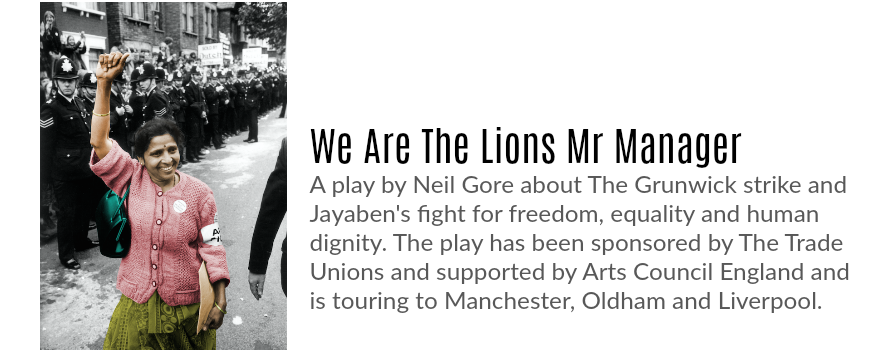A play by Neil Gore about The Grunwick strike and Jayaben's fight for freedom, equality and human dignity. The play has been sponsored by The Trade Unions and supported by Arts Council England and is touring to Manchester, Oldham and Liverpool.
Friday 20th October
The Working Class Movement Library
Tel: 07949635910
Buy tickets online: https://lineupnow.com/event/we-are-the-lions-mr-manager
Saturday 21st October
The working Class Movement Library: Buy tickets https://lineupnow.com/event/we-are-the-lions-mr-manager
NOVEMBER
Thursday 2nd November
Oldham Libraray Theatre Tel 0161 770 8000 https://www.oldham-council.co.uk/…/all-venues/live-thelibrary
Friday 17th November
The Irish Centre, Liverpool 0151 263 1808 https://www.liverpoolirishcentre.org/what-s-on
Tuesday 21st - Saturday 25th November
A new play by Townsend Productions relives the extraordinary true story of the Grunwick Strike, a dispute that challenged the way women and immigrants are treated in the workplace.
On the 20th August 1976 a group of workers in a film processing factory in Willesden walked out in protest at their unfair working conditions, low pay and the 'bullying tactics' used by management.
Led by mostly East African Asian women, the Grunwick strike became one of the longest and most important industrial disputes in British history, and changed the way trade unions thought about race and new immigrant communities coming to Britain in the 1970s.
The women became known as the “strikers in saris” and their fight for fair treatment was supported by thousands of trade unionists and campaigners, as more than 20,000 people joined them at the picket lines on one of the mass pickets.
But the story of the Grunwick dispute is not just a story about ground-breaking solidarity. It is also the story of a remarkable woman, Jayaben Desai.
The four foot ten inches tall, mother-of-two defiantly led the first walk-out in protest against the humiliation she and other women employees felt at the Grunwick factory.
As she left, the manager shouted at Jayaben and her colleagues to “stop chattering like monkeys in a zoo", and Jayaben replied: "What you are running here is not a factory, it is a zoo. But in a zoo there are many types of animals. Some are monkeys who dance on your finger-tips, others are lions who can bite your head off. We are the lions, Mr. Manager!”
Jayaben became the leader of the Grunwick Strike and not only stood up for workers’ rights with selfless dedication, but with her steadfast resolve, she turned the dispute into a national movement for human rights, inspiring future generations and challenging the way people perceived Asian women.
Now, Jayaben's story is being brought to life for the very first time by Townsend Theatre Productions seeking to relive the strikers' inspirational fight for freedom, equality and human dignity.
Written by Neil Gore, the play will tell the story of the Grunwick dispute through a mixture of stirring song, poetry, movement and dance, and the play will utilise Townsend Production's trademark cast of two characters playing multiple roles.
Quote from Neil here about why Jayaben's story deserves to be told: “In our work we aim to focus on the lives and contributions of inspirational and vital figures from our social history, often forgotten, who campaigned vigorously to improve the quality of life for everyone. Jayaben Desai is one such figure. She tirelessly fought on behalf of immigrant workers against exploitative employment practice; fearlessly faced all the elements of establishment authority; alerted many in the trade union movement to the issues of vulnerability of immigrant workers; and highlighted the fight to maintain basic trade union rights. Her resolve and courage should be remembered and celebrated. Also, Grunwick raised many wide-ranging questions about trade unionism, rights in the workplace and dignity at work, themes that still resonate and are relevant today.”


